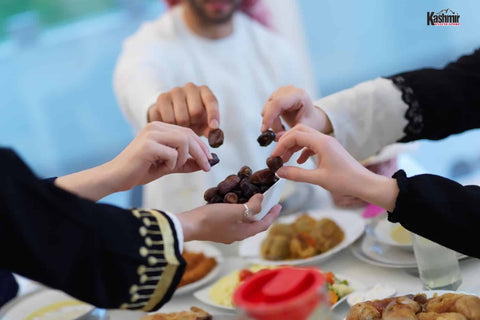Dos And Don'ts Of Ramadan 2024: A Complete Guide To Prepare For Ramadan
Are you ready to embark on a journey of self-reflection and spiritual growth? In the bustling world of 2024, where distractions abound, it's time to pause and embrace the tranquility of Ramadan. As the holy month approaches, it's essential to navigate it with grace and mindfulness. So, let's delve into the dos and don'ts of Ramadan 2024, a complete etiquette guide that will help you make the most of this sacred time.
The holy month of Ramadan, which is also the ninth month of the Islamic calendar, is of great importance to the Muslim community. During this period, Muslims observe fast from dawn to dusk, in addition to abiding by the preset dos and don’ts of Ramadan. As per the Islamic tradition, it is during this time when the Holy Quran was revealed to Prophet Muhammad.
Considered to be one of the Five Pillars of Islam, this month is known to detoxify the soul and bring one closer to Allah. Lasting for 29-30 days, Ramadan is regarded as the time for spiritual reflection, self-discipline, universal brotherhood, worship and self-control. Muslims consume one meal before dusk, which is known as Sahur, and one meal post sunset, known as Iftar. Get ready to discover the practices that will enrich your soul and bring you closer to the divine, while avoiding the pitfalls that may hinder your journey.
Things to do during Ramadan

During Ramadan, it's crucial to observe certain practices and engage in specific activities to fully embrace the spiritual significance of the holy month. One of the most important things to do during Ramadan is fasting from dawn to sunset. This means abstaining from food, drink, smoking, and other physical needs. Fasting helps cultivate self-discipline, empathy for those less fortunate, and a deeper connection with Allah.
It's also important to engage in additional acts of worship, such as reading the Quran, performing extra prayers (Taraweeh), giving charity, and seeking forgiveness. These practices help strengthen one's faith and bring about spiritual growth.
Additionally, participating in community iftars (breaking the fast together) and attending mosque for congregational prayers are highly encouraged. By actively participating in these activities, you can fully immerse yourself in the spiritual atmosphere of Ramadan.
1. Recite the Quran: To fully embrace the spiritual significance of Ramadan, actively engage in reciting the Quran. This sacred text holds immense importance for Muslims during this holy month. Set aside dedicated time each day to sit in a quiet and peaceful environment, allowing yourself to connect with the words of Allah.
Recite the Quran with sincerity, humility, and attentiveness, seeking guidance, wisdom, and spiritual nourishment. As you recite, focus on understanding the meanings and messages conveyed in the verses. Take advantage of the tranquility and spiritual energy of Ramadan to deepen your relationship with the Quran.
Whether it's reading the Quran alone or participating in group recitations, make this practice an integral part of your daily routine during Ramadan. By immersing yourself in the Quran, you can experience a profound spiritual transformation and draw closer to Allah.
2. Offer prayers: During Ramadan, all Muslims must offer Salat, which implies offering prayers five times a day. Salat is one of the Five Pillars of Islam and helps Muslims to seek Allah’s forgiveness and guidance. These prayers are known as Salat al-fajr, Salat al-zuhr, Salat al-‘asr, Salat al-maghrib and Salat al-‘isha. Muslims should perform Dhikr meaning appreciating Allah through their prayers. Muslims should pray for the health and prosperity of their family.
3. Observe fast: Make sure to adhere to the practice of fasting during Ramadan to fully participate in this sacred month. Observing fast is one of the fundamental pillars of Ramadan, and it holds significant spiritual importance for Muslims worldwide.
During the daylight hours, from dawn to sunset, you must abstain from food, drink, smoking, and any other physical needs. Fasting isn't just about refraining from eating and drinking; it also involves controlling your thoughts and actions, practicing patience and self-discipline.
It's essential to start your fast with a pre-dawn meal called Suhoor, and break your fast at sunset with a meal called Iftar. Remember to maintain a humble and grateful attitude throughout the day, as fasting isn't only a physical act but also a spiritual journey of self-reflection and devotion to Allah.
4. Do charity : Engage in acts of charity to enhance your spiritual journey during Ramadan. Giving to those in need is a fundamental aspect of this holy month. By practicing charity, you not only fulfill your religious obligation but also cultivate empathy and compassion towards others.
Consider donating to charitable organizations or directly helping individuals in your community. You can provide food, clothes, or financial assistance to those less fortunate. Additionally, volunteering your time and skills can make a significant impact. Participate in community service projects or organize fundraisers for noble causes.
5. Practice self-discipline and self-control: Developing self-discipline and exercising self-control are essential aspects of observing Ramadan. During this holy month, it's important to focus on restraining oneself from negative behaviors and impulses.
By practicing self-discipline, you can cultivate a stronger sense of self-control and enhance your spiritual connection with Allah. One way to do this is by adhering to the fasting requirements, abstaining from food, drink, and other indulgences from dawn until sunset.
It's also crucial to be mindful of your thoughts, words, and actions, avoiding gossip, anger, and other harmful behaviors. By practicing self-discipline and self-control, you can deepen your understanding of the true purpose of Ramadan and strengthen your commitment to righteousness and spiritual growth.
6. Maintain celibacy: Ramadan is the time to indulge in prayers and create a stronger bond with the Almighty. Hence, the community maintains celibacy during this pious period. It's a time to strengthen one's relationship with God and practice self-restraint in all aspects of life, including maintaining celibacy.
What not to do during Ramadan?

To ensure a respectful and fulfilling Ramadan experience, it's important to be aware of what actions to avoid during this holy month. Firstly, refrain from eating, drinking, or smoking in public during daylight hours, as it shows a lack of respect for those who are fasting.
Additionally, it's crucial to avoid engaging in gossip or spreading rumors, as this goes against the principles of Ramadan, which emphasizes kindness and forgiveness. Furthermore, it's advised not to engage in any form of violence or aggressive behavior, as Ramadan is a time for peaceful reflection and self-control. Lastly, it's important to avoid excessive indulgence in entertainment or material possessions, as Ramadan encourages simplicity and gratitude.
1. Don't consume food/water during the fasting period
During Ramadan, it's important to abstain from consuming any food or water during the fasting period. This is a fundamental aspect of observing Ramadan and showing respect for the religious significance of the month.
The purpose of fasting is to purify the mind, body, and soul, and to develop self-discipline and empathy towards those less fortunate. It's a time for reflection, introspection, and spiritual growth.
As you abstain from food and water from dawn until sunset, it's crucial to remember that the aim isn't just to refrain from consuming these essentials, but also to cultivate a sense of gratitude, patience, and self-control.
2. Don't hold grudges
Avoid harboring resentment or holding grudges during Ramadan. This holy month is a time for reflection, self-discipline, and forgiveness. It's essential to let go of any negative feelings or grievances you may have towards others. Holding grudges only weighs you down and hinders your spiritual growth.
Instead, focus on forgiving and seeking forgiveness. Use this time to mend broken relationships and strengthen bonds with family and friends. Remember, forgiveness is a virtue that brings peace and tranquility to your heart. Embrace the spirit of Ramadan by practicing forgiveness and letting go of any resentment.
Choose love and compassion over anger and bitterness, and you'll experience the true essence of this blessed month.
3. Don't listen to loud music/songs:
Listening to loud music or songs is discouraged during Ramadan. This is because Ramadan is a month of spiritual reflection, self-discipline, and increased devotion. The focus during this holy month should be on prayer, recitation of the Quran, and seeking closeness to Allah.
Loud music or songs can be distracting and may interfere with the peaceful atmosphere that's sought during Ramadan. It's important to create an environment of tranquility and mindfulness, allowing oneself to fully engage in the spiritual practices of fasting and prayer.
Instead of blasting loud music, use this time to listen to soothing recitations of the Quran or engage in quiet reflection. By avoiding loud music, you can fully embrace the serenity and spiritual growth that Ramadan offers.
4. Don't waste time:
Now, let's shift our focus to making the most of your time during Ramadan. One of the important things to remember isn't to waste time. Ramadan is a sacred month for Muslims, and it's essential to utilize every moment in worship and self-reflection.
Avoid engaging in activities that don't contribute to your spiritual growth or the well-being of others. Instead of spending excessive time on social media or watching television, invest your energy in reading the Quran, performing prayers, and engaging in acts of charity.
Use this holy month as an opportunity to deepen your connection with Allah and strengthen your faith. By prioritizing your time and avoiding distractions, you can make the most of Ramadan and reap its countless blessings.
Conclusion
In conclusion, observing the dos and don'ts of Ramadan 2024 is essential to maintain a respectful and spiritual experience. By reciting the Quran, offering prayers, observing fasts, doing charity, and avoiding negative behaviors like holding grudges and listening to loud music, individuals can fully embrace the significance of this holy month. Remember, time is precious during Ramadan, so it's important to make the most of it and avoid wasting it on unproductive activities.
